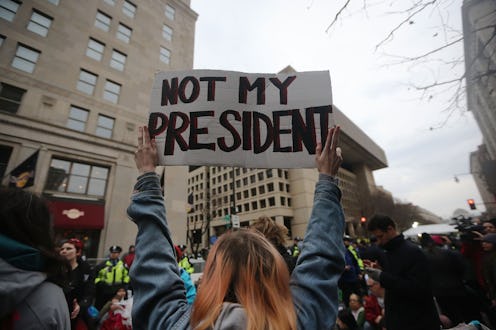News
Why Around 200 People Are Facing 60 Years In Prison For Protesting Donald Trump

The trial of some 200 people who protested during President Donald Trump's inauguration began this week and already, it's led to a number of alarming questions. Among them: With Trump protesters facing up to 60 years in jail for dissent, does the punishment fit the crime?
In a conversation with Bustle, Sam Menefee-Libey, an organizer with Dead City Legal Posse, a collective of legal activists, calls the arrest and trials "an unprecedented attack on protesters" that is entirely politically motivated. It's also an attack that, he and other activists argue, could make for a dangerous precedent. "This could be a new tool for the Department of Justice or other institutions to repress civil rights," he says.
Menefee-Libey, who is not a lawyer, attended an anti-capitalist/anti-fascist march on Inauguration Day, one of several dozen protests (known as Disrupt J20) taking place around the same time. "Some property destruction occurred," he says, adding that some people smashed windows, or started fires.
But it wasn't only those who destroyed property who were arrested. Instead, he says, "the police then kettled and mass arrested over 230 people, rounding up marchers, medics, legal observers, journalists, and blanket charging everyone with felony rioting."
D.C. Police Chief Peter Newsham, who oversaw the crackdown, told a local radio station that "all the police officers were outstanding in the judgment that they used." The District Police Department defended its actions in a statement alleging that those arrested "engaged in acts of vandalism and several instances of destruction of property" such as damaging cars and igniting fires. Mayor Muriel Bowser also tweeted her support for the police.
Menefee-Libey was not arrested, but others were slapped with one count of felony rioting. Within weeks, the charges had been dropped against a handful of those initially charged (including journalists), but for others, the charges got worse. By April, a grand jury had added counts of incitement to riot, counts of conspiracy to riot, and counts of property destruction. They are facing up to 60 years in jail — an accumulation of the maximum penalties for each charge.
According to Menefee-Libey, the continually shifting charges are evidence that the arrests and trial are politically motivated. Plus, the most troubling part, he says, is that the prosecution, led by Kerkhoff, is going after such a large group — many members of which likely had no part in damaging property. "The U.S. Attorney's office is clearly just trying to be as punitive as possible — I think to scare people into taking pleas."
"The prosecutor has been very open about the fact that she is prosecuting the group. Near-presence is enough to convict them," Menefee-Libbey says. "It's a very scary legal theory and a very scary use of the riot statute, especially considering there have been other riots in the past couple of years that didn't see this sort of response."
During a July hearing, Assistant U.S. Attorney Jennifer Kerkhoff argued that defendants didn’t need to personally damage property to be charged or convicted. "A person can be convicted of rioting without breaking a window," she said. "It is the group who is the danger, the group who is providing the elements.” At the time, she agreed to drop one of the charges after acknowledging that the count, misdemeanor assault on a police officer, was based on an inoperative statute.
In the months since the arrests and revised charges, the prosecution's behavior has continued to raise eyebrows. Prosecutors have obtained a number of warrants allowing them to investigate the social media accounts of the defendants. One warrant sought a list of all visitors to an anti-Trump website promoting protests on Inauguration Day.
Opening arguments for the first group to go on trial began Monday, with arguments for all of the nearly 200 defendants scheduled through October 2018. In her opening statement, Kerkhoff described the protests as "a sea of black masks," and argued again, "You don’t have to be the one who breaks the window to be guilty." All of those arrested, she claimed, "actively helped those with the hammers and crowbars" and were "playing a role in the violence and destruction."
As a recent op-ed in The Guardian notes, the arrests of Trump protestors — and ensuing investigation into their private lives — bears a striking contrast to the Administration's response to other extreme protests, such as the neo-Nazi and white nationalist rallies in Charlottesville, which ultimately led to the death of Heather Heyer. In that case, President Donald Trump defended those who marched, saying there were "very fine people" among them.
Menefee-Libbey compares the mass arrest event to one that occurred at D.C's Pershing Park in 2002, following a World Bank protest. In that instance, the District and U.S. authorities wound up paying more than $13 million in settlements to resolve litigation stemming from the arrests.
There are currently multiple pending lawsuits that have been filed against the police for unlawful arrest and brutality in regards to the Inauguration Day arrests. No word yet on when those may be taken to court.